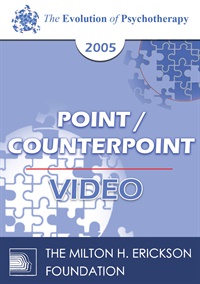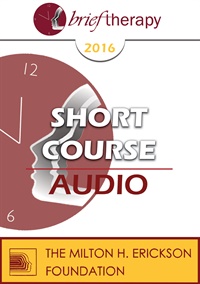
- Average Rating:
- Not yet rated
- Topic Areas:
- Short Courses | Brief Therapy | Community | Multicultural | Therapist Development
- Categories:
- Brief Therapy Conference | Brief Therapy Conference 2016
- Faculty:
- Karin Schlanger, MFT | Gloria Diaz Arnal, MFT Intern
- Duration:
- 1:11:09
- Format:
- Audio Only
- Original Program Date:
- Dec 08, 2016
- Short Description:
- Palo Alto Brief Therapy model applied in an educational context. Focus on advantages of using this approach when the context is a challenge in itself. The presenters – Ms. Schlanger is the heir to the MRI-Brief Therapy model, will bring examples illustrating a useful model when working with a diverse community.
- Price:
- $15.00 - Base Price
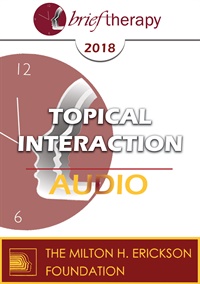
- Average Rating:
- Not yet rated
- Topic Areas:
- Topical Interactions | Anxiety | Brief Therapy | Children and Adolescent Therapy | Community | Depression
- Categories:
- Brief Therapy Conference | Brief Therapy Conference 2018
- Faculty:
- Lynn Lyons, LICSW
- Duration:
- 1:03:32
- Format:
- Audio Only
- Original Program Date:
- Dec 08, 2018
- Short Description:
- Educators are being asked to do more and more to support the emotional wellbeing of students and understand the mental health needs of their students. Programs are consistently being introduced and professional development offered. What's working and what isn't? How much can we expect of teachers and administrators? How is the collaboration and communication between parents, schools, and outside providers going? And what are students actually earning in about their mental health in school?
- Price:
- $15.00 - Base Price
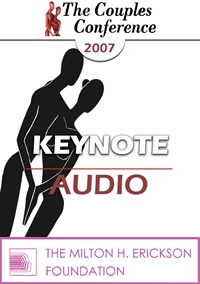
- Average Rating:
- Not yet rated
- Topic Areas:
- Keynotes | Abuse | Couples Therapy | Multicultural | Community | Gender
- Categories:
- Couples Conference | Couples Conference 2007
- Faculty:
- Cloe Madanes, HDL, LIC
- Duration:
- 59:31
- Format:
- Audio Only
- Original Program Date:
- Apr 27, 2007
- Short Description:
- This presentation will cover the assessment and detection of spousal and partner abuse, as well as intervention strategies. Community resources, cultural factors and same gender abuse dynamics also will be discussed.
- Price:
- $15.00 - Base Price
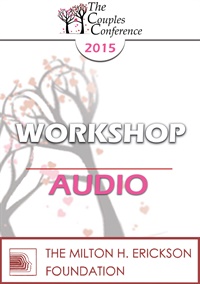
- Average Rating:
- Not yet rated
- Topic Areas:
- Couples Therapy | Workshops | Relationships | Therapist Development | Community
- Categories:
- Couples Conference | Couples Conference 2015
- Faculty:
- William Doherty, PhD
- Duration:
- 1:50:01
- Format:
- Audio Only
- Original Program Date:
- Apr 26, 2015
- Short Description:
- People turn to friends and family long before they go to a couples therapist. Marital First Responders is a new training program for people who are natural confidants on relationship problems: people turn to them for support and perspective. Learn what the training involves, tune your skills in being a confidant in your own social world, and see if you’d like to teach this course in your community.
- Price:
- $15.00 - Base Price
- Average Rating:
- Not yet rated
- Topic Areas:
- Point/Counterpoint Sessions | Multicultural | Community | Psychotherapy
- Categories:
- Evolution of Psychotherapy | Evolution of Psychotherapy 2005
- Faculty:
- Jean Houston, PhD | Mary Catherine Bateson, PhD
- Course Levels:
- Master Degree or Higher in Health-Related Field
- Duration:
- 1:19:00
- Format:
- Audio and Video
- Original Program Date:
- Dec 08, 2005
- Short Description:
- Worldwide, societies are crying for assistance in the transformation of their citizens, organizations and institutions. The social artist as cultural therapist offers a new paradigm of sustainable human development, one that supports human development in its most primary form: the development of capacities, skills and potentials that activate the individual and groups in ways that enhance their societal choices and commitments, liberates their inventiveness and raises levels of esteem and cooperation essential to carrying out the goals of making a better world.
- Price:
-
Sale is $29.00
price reduced from Base Price - $59.00
Credit available - Click Here for more information
- Average Rating:
- Not yet rated
- Topic Areas:
- Speeches with Discussants | Gestalt | Life Focus Community | Psychotherapy | Community
- Bundle(s):
- EP17 Video Stream Build a Bundle | Learning Track - EP17 Gestalt Stream
- Categories:
- Evolution of Psychotherapy | Evolution of Psychotherapy 2017 | Evolution of Psychotherapy Gestalt Learning Track | Online Continuing Education
- Faculty:
- Erving Polster, PhD | Michael Yapko, PhD
- Course Levels:
- Master Degree or Higher in Health-Related Field
- Duration:
- 1:24:44
- Format:
- Audio and Video
- Original Program Date:
- Dec 16, 2017
- Short Description:
- Living is composed of a supreme flow of experiences. Therefore, people face a commanding challenge to their integrative powers. Telling helps them by revisiting this landscape, revealing the accessibly hidden markers of a lifetime. Dr. Polster will show how a sharply pointed attention to universal themes within a group process will light up our lives, giving shape to personal perspective. Techniques and precedents for conducting this process will be addressed.
- Price:
-
Sale is $29.00
price reduced from Base Price - $59.00
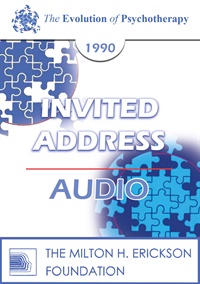
- Average Rating:
- Not yet rated
- Topic Areas:
- Invited Addresses | Addiction | Community | Social Issues | Psychotherapy
- Categories:
- Evolution of Psychotherapy | Evolution of Psychotherapy 1990
- Faculty:
- Thomas Szasz, MD | Rollo May, PhD
- Duration:
- 1 Hour 20 Minutes
- Format:
- Audio Only
- Original Program Date:
- Dec 15, 1990
- Short Description:
- Dr. Szasz will present a brief historical review of drug controls in the United States; a critical analysis of the transformation of the trade in drugs from a free market at the beginning of the century to a tightly statist system of controls today; and a market-oriented analysis of the "drug problem."
- Price:
- $15.00 - Base Price
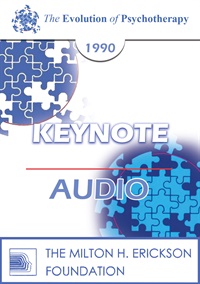
- Average Rating:
- Not yet rated
- Topic Areas:
- Keynotes | Community | Femininity | Gender | Masculinity | Social Issues | Psychotherapy
- Categories:
- Evolution of Psychotherapy | Evolution of Psychotherapy 1990
- Faculty:
- Betty Friedan
- Duration:
- 1 Hour 6 Minutes
- Format:
- Audio Only
- Original Program Date:
- Dec 16, 1990
- Short Description:
- The enormous changes brought about in the last 25 years by the women's movement and the sex role revolution have opened new possibilities and problems-sources of conflict and new strengths for women, men and families. There is a challenge now for psychotherapists to break through their own remnant stereotypes of feminine mystique, masculine mystique, and obsolete assumptions about family so that they may distinguish between personal and political pathology and help evolving women, men and families find and use more consciously their new strengths and confront real problems realistically.
- Price:
- $15.00 - Base Price
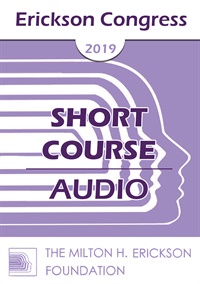
- Average Rating:
- Not yet rated
- Topic Areas:
- Short Courses | Multicultural | Religion | Community
- Categories:
- Erickson Congress | Erickson Congress 2019
- Faculty:
- Joanne Ginter, MA
- Duration:
- 1 Hour 6 Minutes
- Format:
- Audio Only
- Original Program Date:
- Dec 12, 2019
- Short Description:
- This workshop emphasizes ways culture and religion can be integrated into the therapeutic discourse through the promotion of intercultural resiliency. Interculturalism allows for relationship building and learning from each other while taking the therapist deeper than multicultural or cross-cultural communication. Resiliency as a healing process allows for creating new meanings to unfortunate life events based on developing the self through mentorship and community, the building blocks of resiliency.
- Price:
- $15.00 - Base Price
Tags: Community Multi-Cultural Religion
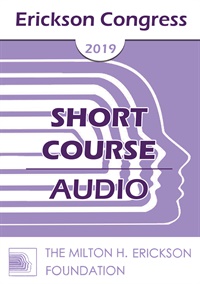
- Average Rating:
- Not yet rated
- Topic Areas:
- Short Courses | Community | Ericksonian Hypnosis and Therapy Techniques | Relationships
- Categories:
- Erickson Congress | Erickson Congress 2019
- Faculty:
- Gabrielle Peacock, MBBS
- Duration:
- 1 Hour 25 Minutes
- Format:
- Audio Only
- Original Program Date:
- Dec 12, 2019
- Short Description:
- Dr Erickson’s work with individuals, couples and families has been well explored, but what is often overlooked is his skill in information gathering and interventions that connected a client to their community. Communities are not what they were in his time and attempts to do this without first building a healing community can be fraught.
- Price:
- $15.00 - Base Price
Please wait ...


